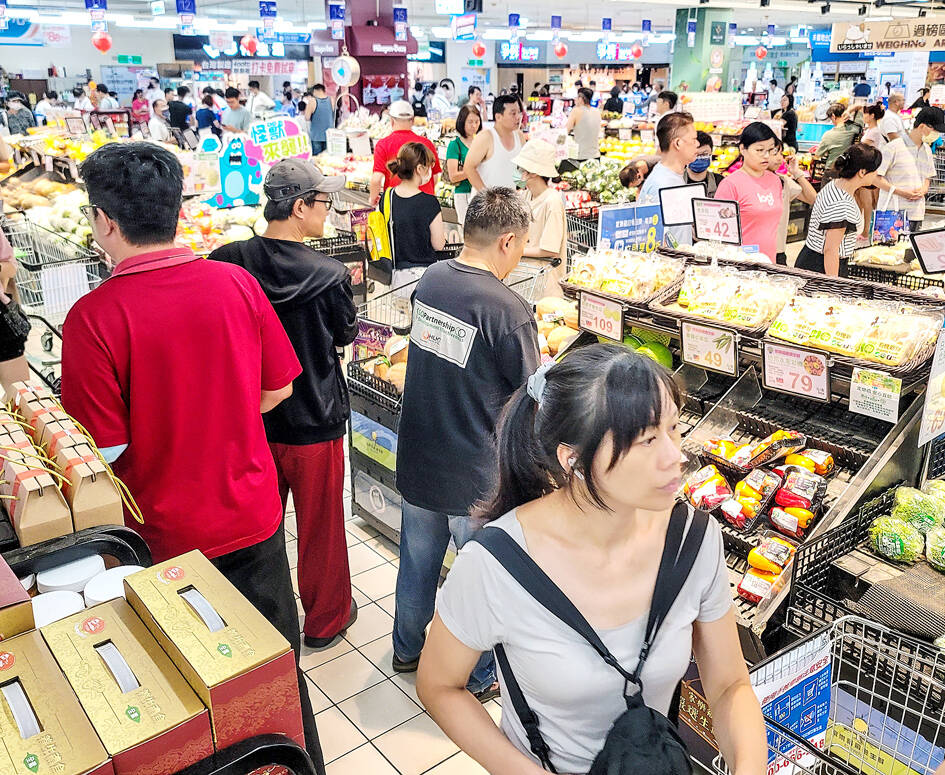Sales in the retail, and food and beverage sectors last month continued to rise, increasing 4.3 percent and 14.3 percent respectively from a year earlier, while sales in the wholesale sector fell for a 10th straight month and declined 5 percent annually, the Ministry of Economic Affairs said on Saturday.
The ministry forecast that retail, and food and beverage sales would retain growth momentum this month due to the opening of new shopping malls and the Mid-Autumn Festival.
However, the wholesale sector is predicted to see sales drop for another month on an annual basis, as end-market demand remains weak and inventory adjustments persist, it said.

Photo: CNA
HOLIDAY WINDFALL
Last month, the retail sector’s sales were NT$373.6 billion (US$11.63 billion), driven mainly by higher sales in department stores, supermarkets, convenience stores and hypermarkets as people spent more during the summer vacation and prepared offerings for the Chung Yuan Festival, which is part of Ghost Month.
In the first eight months of the year, retail sales totaled NT$2.981 trillion, up 7.9 percent from a year earlier, ministry data showed.
The ministry said it expects retail sales to grow between 3.1 and 6.1 percent annually to between NT$364.3 billion and NT$374.9 billion this month.
Sales in the food and beverage sector reached NT$89.8 billion last month, as catering service providers posted a 56.9 percent annual increase in sales due to robust demand for in-flight meals, while restaurant sales rose 15.1 percent year-on-year because of the holiday effect and summer vacation, the report said.
UNDER PRESSURE
In the first eight months of the year, food and beverage sales rose 23.5 percent year-on-year to NT$683.6 billion, while sales this month are projected to grow 13.5 to 16.5 percent to between NT$81.9 billion and NT$84 billion, it said.
However, the wholesale sector remained under pressure last month, with sales dropping to NT$986.1 billion as lackluster demand for machinery equipment, building materials and chemicals offset solid sales of automobiles, motorcycles, food and tobacco products, the report said.
Cumulative sales in the sector in the first eight months fell 10.5 percent to NT$7.58 trillion, it said.

The Eurovision Song Contest has seen a surge in punter interest at the bookmakers, becoming a major betting event, experts said ahead of last night’s giant glamfest in Basel. “Eurovision has quietly become one of the biggest betting events of the year,” said Tomi Huttunen, senior manager of the Online Computer Finland (OCS) betting and casino platform. Betting sites have long been used to gauge which way voters might be leaning ahead of the world’s biggest televised live music event. However, bookmakers highlight a huge increase in engagement in recent years — and this year in particular. “We’ve already passed 2023’s total activity and

Nvidia Corp CEO Jensen Huang (黃仁勳) today announced that his company has selected "Beitou Shilin" in Taipei for its new Taiwan office, called Nvidia Constellation, putting an end to months of speculation. Industry sources have said that the tech giant has been eyeing the Beitou Shilin Science Park as the site of its new overseas headquarters, and speculated that the new headquarters would be built on two plots of land designated as "T17" and "T18," which span 3.89 hectares in the park. "I think it's time for us to reveal one of the largest products we've ever built," Huang said near the

China yesterday announced anti-dumping duties as high as 74.9 percent on imports of polyoxymethylene (POM) copolymers, a type of engineering plastic, from Taiwan, the US, the EU and Japan. The Chinese Ministry of Commerce’s findings conclude a probe launched in May last year, shortly after the US sharply increased tariffs on Chinese electric vehicles, computer chips and other imports. POM copolymers can partially replace metals such as copper and zinc, and have various applications, including in auto parts, electronics and medical equipment, the Chinese ministry has said. In January, it said initial investigations had determined that dumping was taking place, and implemented preliminary

Intel Corp yesterday reinforced its determination to strengthen its partnerships with Taiwan’s ecosystem partners including original-electronic-manufacturing (OEM) companies such as Hon Hai Precision Industry Co (鴻海精密) and chipmaker United Microelectronics Corp (UMC, 聯電). “Tonight marks a new beginning. We renew our new partnership with Taiwan ecosystem,” Intel new chief executive officer Tan Lip-bu (陳立武) said at a dinner with representatives from the company’s local partners, celebrating the 40th anniversary of the US chip giant’s presence in Taiwan. Tan took the reins at Intel six weeks ago aiming to reform the chipmaker and revive its past glory. This is the first time Tan